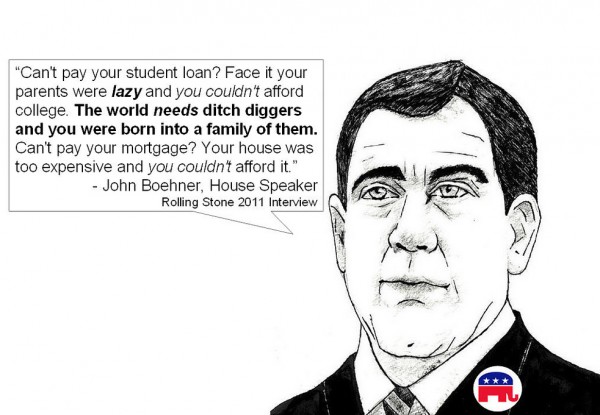You are being fucked in ways that, until recently, were still illegal in Georgia and Texas and you don’t even know it. So by all means, keep laughing at Honey Boo-Boo and the Kardashians and hating on Anne Hathaway. It’s just what they want.
RELATED: Five Myths About Sequestration Republicans Pray You Are Too Stupid Or Busy To Question
RELATED: One of the most persistent myths amongst Republicans and conservatives is the notion that lower income tax rates, especially on the wealthy, are the key to restoring the economy. This morning on Meet the Press, when House Speaker John Boehner (R-OH) once again trotted out this claim, host David Gregory quite rightly responded that “there’s no iron-clad evidence that lowering marginal tax rates is going to lead to economic growth.” Strikingly, the exchange began with Boehner making the very uncharacteristic — but entirely correct — point that “we can’t cut our way to prosperity,” and that we have to restore economic growth. As a way to do that, he cited the Republican plan to cut loopholes out of the tax code, and then use the extra fiscal room created by eliminating those deductions to lower tax rates. Gregory responded by pointing out that tax rate hikes under Presidents Reagan and Clinton corresponded with economic booms:
 JOHN BOEHNER: We’ve got to find a way through our tax code to promote more economic growth in our country. We can do this by closing loopholes, bringing the rates down for all Americans, making the tax code fairer — it will promote more economic growth.
JOHN BOEHNER: We’ve got to find a way through our tax code to promote more economic growth in our country. We can do this by closing loopholes, bringing the rates down for all Americans, making the tax code fairer — it will promote more economic growth.
DAVID GREGORY: But there’s no iron-clad evidence that lowering marginal tax rates is going to lead to economic growth.
BOEHNER: Oh yes there is. There’s mountains…
GREGORY: Bill Clinton raised taxes. President Reagan raised taxes.
BOEHNER: There’s mountains of evidence that if we bring tax rates down, we will help spur economic growth in our country.
GREGORY: That hasn’t been tried before?
BOEHNER: Uh, yeah. Ronald Reagan. 1981. […]
GREGORY: But he raised taxes as well, and it didn’t hurt the economy, did it?
BOEHNER: Listen, he lowered taxes twice. Both in 1981 and again in the 1986 tax reform. When they lowered rates for all Americans, we had this boom in economic growth. Why? Because we got rid of a lot of the silly deductions, brought the rates down, and it helped promote more economic growth in our country.
In general, periods of high economic growth in America over the 20th Century actually occurred alongside much higher top marginal rates than we have now. Gregory is even more correct than he realizes. One fact neither man brought up is that the 1981 tax cut occurred in conjunction with one of the biggest single cuts in interest rates the Federal Reserve has ever carried out. By 1980, inflation had risen to nearly 15 percent. In response, Fed Chairman Paul Volcker raised the Federal Funds rate — which in turn drives interest rates throughout the economy — to an historic high of almost 20 percent. The gambit worked. Inflation has been at near-historic lows ever since, and Volcker cut interest rates back down to under 10 percent. Any economist worth their salt would agree that an interest rate hike of that magnitude will bring on a recession, and that a compoarable cut in interest rates will be a big boost to economic growth.
Bruce Bartlett, a senior economic policy advisor in the Reagan Administration, has pointed out the cuts were specifically designed to combat high inflation and to work in conjunction with the Fed’s strategy of hiking and then cutting interest rates. On top of that, the top marginal income tax rate before the cuts in 1981 was 70 percent, versus the 39.6 percent the country is at now. So even if you concede the 1981 tax cut’s importance, there’s no way to duplicate its effect. It was designed for a situation of low growth, high inflation, and high marginal income tax rates. Our situation now is low growth and low inflation — precisely the situation deficit-financed Keynesian stimulus was designed to address — along with historically modest marginal income tax rates. Citing the 1981 cut as a solution for our current problems is a giant non sequitur. As for the 1986 tax cut, Boehner is simply wrong. Bartlett ran the numbers on that too, and there’s no evidence that either economic growth or the employment rate was affected by the policy change. MORE

